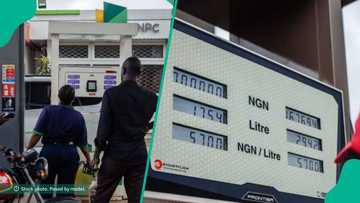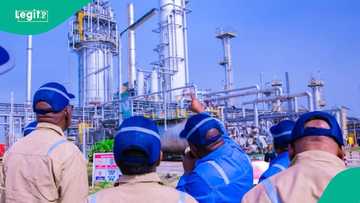Dangote Refinery Crashes Diesel Prices by N55 Per Litre as Marketers Abandon NNPC
- The Dangote Refinery has reduced diesel prices again from N1,075 per litre to N1,025, saying the gesture is to help Nigerians
- The development comes after the facility crashed petrol prices in December from N970 per litre to N890
- Analysts have praised the refinery, which hopes to reach full refining capacity in March
Legit.ng’s Pascal Oparada has reported on tech, energy, stocks, investment and the economy for over a decade.
Dangote Refinery has crashed diesel prices to N1,020 per litre from N1,075 at the loading gantry.
The Refinery said the move was to serve its customers and Nigerians better.

Source: UGC
Dangote Refinery reportedly sacrifices N10bn on subsidy
This is the third time the plant has reduced diesel prices since it started producing the commodity in January 2024 from N1,700 per litre to the current price.
The development follows the refinery’s reduction of petrol prices from N970 to N890 per litre.
Ken Ife, an economist disclosed that the facility sacrificed about N10 billion to make petrol available to Nigerians at a uniform price during the Christmas and New Year holidays.
He applauded the Lekki-based plant for setting a new benchmark in Nigeria’s energy industry and unlocking export opportunities.
According to him, the equalisation fund was responsible for managing price differentials and transport costs involved in distributing petrol nationwide.
Dangote Refinery to reach full capacity in 30 days
A previous report by Legit.ng said that the 650,000 bpd-capacity facility hopes to reach full capacity in 30 days.
The president of Nigeria's Dangote Oil refinery, the biggest in Africa, stated Monday that it may start running at full capacity in 30 days.
Nigerian billionaire Aliko Dangote constructed a refinery in Lagos that can handle 650,000 barrels per day. It produced jet fuel, naphtha, diesel, and other products from crude in January of last year.

Read also
Dangote refinery finally breaks silence on running at full capacity, gives implementation timeline
In September, it began processing gasoline. When running at full capacity, it hopes to compete with European refiners, but it has been having trouble obtaining enough crude locally.
The Dangote oil refinery's head, Edwin Devakumar, stated that the facility was now running at 85% capacity and that "we can go 100 per cent in 30 days."
Reuters reported that despite an arrangement with the Nigerian government to purchase petroleum in the local currency, the refinery was unable to secure adequate volumes last year and had to import crude.
Analyst praises Dangote Refinery
According to the oil regulator, it has requested 550,000 barrels per day of crude from Nigerian oil producers for January through June of this year. It has also threatened to revoke export permits for oil cargoes from producers who do not fulfil their agreed-upon supply quota to local refineries.
An energy policy analyst, Adeola Yusuf, stated that the current diesel price crash will reflect not just at the pumps but also production costs in factories nationwide.
He said long-haul vehicles which use diesel may also reduce transportation costs.
“Yes, it will have a positive ripple effect on the economy. Manufacturers and SMEs spend a humongous amount on energy, mainly diesel. If they sustain the price reduction will affect the cost of goods in the market because manufacturers will reflect the new price,” he said.
NNPC, oil marketers import N5.5 trillion worth of fuel
Legit.ng earlier reported that Despite many functional refineries including the Dangote, Port Harcourt, Warri, and other facilities, the Nigerian National Petroleum Company Limited (NNPC) spearheaded fuel imports worth N5.5 trillion in four months.
Between October 2024 and January 2025, Nigeria imported about 3.2 million metric tonnes of petrol and 890,485 metric tonnes of diesel.
The amount translates to about 4.29 billion litres of PMS and 1.153 billion litres of diesel when converted at 1,342 litres per metric tonne for PMS and 1,176 litres per metric tonne for diesel.
Proofread by Kola Muhammed, journalist and copyeditor at Legit.ng
PAY ATTENTION: Сheck out news that is picked exactly for YOU ➡️ find the “Recommended for you” block on the home page and enjoy!
Source: Legit.ng





